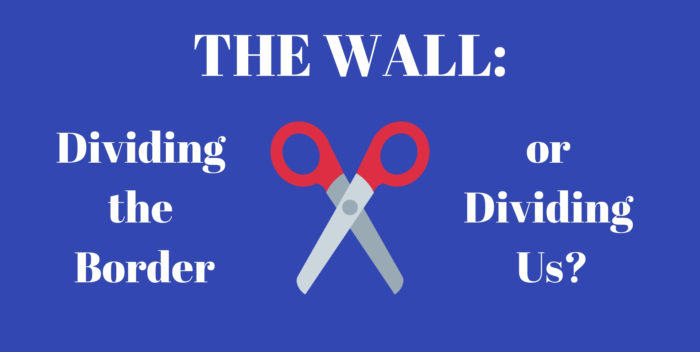The Wall: Dividing the Border or Dividing Us?
by April Bayer
“I would build a great wall, and nobody builds walls better than me, believe me, and I’ll build them very inexpensively. I will build a great, great wall on our southern border. And I will have Mexico pay for that wall.”
President Donald Trump spoke these words during a speech at Trump Tower on June 16, 2015. He made similar remarks on several other occasions, as reported by TIME. And yet, this funding has not appeared.
Reports on the cost of the wall’s construction and maintenance vary. The New York Times reported in April 2017 that the wall could cost the United States between $70 billion and $150 billion each year to maintain and $21.6 billion without maintenance costs.
Meanwhile, a statistician writing for Fox News estimated the total costs to be around $25 billion. This does not just include construction, but also the just compensation which would legally have to be provided to private landowners who would stand to lose property, as they currently possess over 60 percent of the land along the border.
According to National Geographic, the wall’s construction could also have a significant impact on the environment. It would lead to increased risk of soil erosion and alter natural water flows and paths of wildfire, posing multiple dangers to the 62 critically endangered species of plants and animals native to the borderlands. Up to 346 native wildlife species could be barred from large sections of their natural habitats.
This wall, which has not even been fully built, has already caused a significant amount of division. It divides the nation along ethnic and political lines. It divides my family dinner table at Thanksgiving. It divides communities occupied by locally-born citizens and immigrants alike, many of whom wonder what impact the president’s decisions will have on their future, whether they entered this country legally or not.
Clearly, the wall comes with some heavy costs that extend far beyond the billions of dollars in funding the United States would have to provide.
ABC News reported that, when justifying his recent decision to declare a national emergency to secure additional funding, the president cited an “invasion of our country with drugs, with human traffickers, with all types of criminals and gangs” as the reason for his decision.
This is a valid point to consider. Increased border security, in whatever form it might take, has the potential to help the United States combat issues of illegal drugs and human trafficking, problems which endanger and are perpetuated by people on both sides of the border. While I want my country to be welcoming to those seeking shelter, safety and new opportunities, I also want our nation’s citizens to be safe.
The question a lot of people ask when they approach difficult and divisive issues like the wall is, “Do the benefits outweigh the costs?”
However, a wise person once encouraged me to ask a more useful question: “Is there a way to gain the same potential benefits at less of a cost?” As a citizen, I ask, “Is there a way to improve border security and restrict the drug and sex trades that will not require our nation to pay such a high financial, environmental and social cost?”
A variety of sources offer potential alternatives to improve border security. These include addressing the backlog of asylum applications for entry into the U.S.; creating more secure ports of entry, where the majority of criminal apprehensions occur (as opposed to the miles of desert between ports the wall would cover); and investing in technology and personnel that could assist in combating illegal activity.
To me, all of these alternatives seem reasonable and potentially more effective than a physical barrier. I agree with the president and many citizens of our country who proclaim that something must be done to improve border security. In regards to the wall, I leave them with two questions: Is there another, more effective way? And is this division truly worth the cost?










